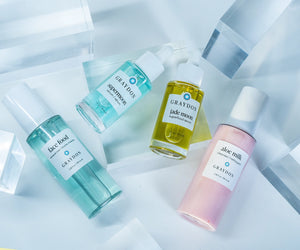IN THIS ARTICLE:
- What do fatty alcohols do in skincare formulations?
- Fatty alcohols in Graydon Skincare products
- Summary
You probably know that alcohol dries out your skin.
And you’ve probably heard that you should avoid skincare products that contain alcohol.
This is true of isopropyl alcohol, ethyl alcohol and denatured alcohol (to name a few). They are harsh alcohols that can dry out the skin and cause irritation. I’m sure we’ve all used too much hand sanitizer lately and know exactly what I’m talking about.
But did you know that there are good alcohols that you want in your skincare products?
It’s true!
pullquote
Don’t be alarmed if you’re scanning a product label and see cetyl alcohol, stearyl alcohol, cetearyl alcohol, phenethyl alcohol, pentylene glycol or propanediol.
I’ll admit, these ingredients sound a little frightening. But there’s no need for alarm. These are fatty alcohols and they’re actually good.
Fatty alcohols are commonly derived from plants including palm, coconut and corn, but they can also come from animal sources. Rest assured that at Graydon Skincare, we only use plant-based fatty alcohols in our products.
Now to answer the important question…
What do fatty alcohols do in skincare formulations?
Fatty alcohols play a few key roles in skincare formulations. They are:
- Emollients
- Emulsifiers
- Thickeners
- Preservatives
Cetyl alcohol, stearyl alcohol, cetearyl alcohol
These fatty alcohols have emollient properties. Meaning they help to moisturize and soften the skin. However, their main function in skincare products is to stabilize the formulation.(1)(2)(3) They do this by:
Preventing separation of the formula: As emulsifiers, they help other ingredients in the formula blend together nicely to form a smooth, uniform mixture. Without an emulsifier, your favourite cream or lotion would separate into a watery part and an oily part.
Controling viscosity: As thickeners, they help give lotions and creams a more luxurious texture and feel.
If you have dry skin, don’t shy away from products with cetyl alcohol, stearyl alcohol or cetearyl alcohol. All of these ingredients work to create a luxurious lotion that glides on smoothly and evenly to help to soften the skin.
Fun fact: cetearyl alcohol is a combination of cetyl alcohol and stearyl alcohol.(3)
Phenethyl alcohol, pentylene glycol, propanediol
At Graydon Skincare, the phenethyl alcohol and propanediol that we use are all-natural preservatives derived from non-GMO corn. They have antimicrobial functions against bacteria, fungi, yeast and mold.(4)(5)
In addition to protecting skincare products from bacteria growth, phenethyl alcohol also has a mild rose-like aroma that helps to cover less-pleasant aromas from other ingredients.(4) Propanediol also has a second function as an emollient.
The pentylene glycol in our products is another all-natural preservative. This one is derived from non-GMO sugar cane and corn cobs. It has antimicrobial functions against bacteria and yeast. Similar to propanediol, pentylene glycol also has emollient properties and helps to moisturize and soften the skin. If that’s not enough, this hardworking ingredient also acts as an emulsifier to keep skincare products from separating.(6)
Basically, the main function of phenethyl alcohol, pentylene glycol and propanediol is to prevent nasties from growing in your skincare products after you’ve opened them. Even with these preservatives, it’s best not to touch your skin with your skincare dispensers. That means keeping your serum droppers off of your face and not using your finger to wipe your moisturizer pump.

Fatty alcohols in Graydon Skincare products
Cetyl alcohol, stearyl alcohol, cetearyl alcohol, phenethyl alcohol, pentylene glycol and propanediol are common ingredients in skincare because they perform such important functions.
Skincare products that contain these fatty alcohols can be labelled as alcohol-free.
You’ll find these beneficial fatty alcohols in most Graydon Skincare products.
Cetyl alcohol and stearyl alcohol: Face Glow, Aloe Milk Cleanser, Skin Stuff, All Over Lotion
Cetearyl alcohol: Berry Rich, Face Glow, Aloe Milk Cleanser, Skin Stuff, Phyto Clear, Putty, Matcha Mint Shampoo, Matcha Mint Hair Smoothie, All Over Lotion
Phenethyl alcohol, pentylene glycol and propanediol: Fullmoon Serum, Berry Rich, Face Glow, Aloe Milk Cleanser, Face Food Mineral Mist, Skin Stuff, Phyto Clear, Face Foam, Putty, All Over Soap
Summary
- Not all alcohols are bad for the skin.
- Drying alcohols like isopropyl alcohol, ethyl alcohol and denatured alcohol should be avoided in skincare products.
- Fatty alcohols play an important role in skincare formulations.
- The main function of cetyl alcohol, stearyl alcohol and cetearyl alcohol is to give skincare products a thick, consistent texture.
- The main function of phenethyl alcohol, pentylene glycol and propanediol is to prevent bad bacteria from growing in skincare products.
- Products containing fatty alcohols can be labelled as alcohol-free.
- The fatty alcohols used in Graydon Skincare products are all plant-based.
- Fatty alcohols can be found in most Graydon Skincare products.
__________________
A simple skincare routine can help reduce breakouts. Keep reading to learn which Graydon Skincare products are best to help clear teen acne.



